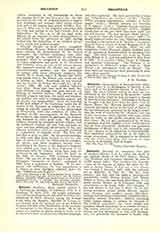

Bellenden (BALLENDEN, or BALLANTYNE), JOHN.—a Scotch poet, b. at Haddington or Berwick in the latter part of the fifteenth century; d. at Rome, c. 1587. He was a Catholic and at an early age matriculated at the University of St. Andrews. Later he went to Paris, where he took the degree of Doctor of Divinity at the Sorbonne. Returning to Scotland, he brought with him from Paris the great work by Hector Boece, the “Historia Scotorum”, and was received with great favor at the court of James V. He was subsequently appointed by the king to undertake the work of translating the “Historia” into the Scotch vernacular, which, together with some poems that he wrote at this period, occupied him about three years. He was also commissioned by the king to translate Livy into English, a work which hitherto had not been attempted. Bellenden was appointed Archdeacon of Moray, and in the succeeding reign he was vigorous in his opposition to Protestantism. This opposition subsequently led to his flight to escape persecution. He is supposed to be identical with one of the same name who was at one time secretary to Archibald, Earl of Angus.
THOMAS GAFFNEY TAAFFE

